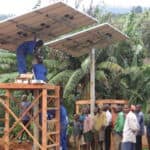Agency Banking and Off-Grid Energy: Banking the Unbanked Through Solar
Sarayah* lives in a remote part of Lagos State, Nigeria, that reflects the harsh realities of rural communities around metropolitan areas. Infrastructure is poor in her area (by national standards), residents are geographically isolated – and most importantly, the community is completely off the grid. Given these conditions, it’s no wonder that access to off-grid renewable energy is generating so much interest among business and development-sector actors focused on these areas.
In Sarayah’s village and countless other rural communities in Africa, innovative solutions for providing off-grid renewable electricity are gaining momentum. Whereas solar panels used to be accessible only to the rich, innovations in the industry have driven the cost of solar down. Combined with sustainable business models that serve the people at the base of the pyramid (BoP), this is bringing solar within the reach of last-mile customers.
Solar providers now offer a wide range of modern stand-alone solutions, such as lamps and solar home systems, that offer capabilities beyond providing light, giving people living off-grid their first taste of modern technology. These solutions are often cheaper, safer and cleaner than the alternative modes of energy available. They’re also easier and faster to deliver than extending the national grid (which is not a possibility in most remote communities). The benefits of these systems are huge, and they extend beyond providing power to include numerous environmental, health and quality-of-life impacts.
Solving the Solar Financing Challenge
However, though these new solar products are less expensive than electricity from the national grid and non-renewable sources like kerosene lamps, their up-front cost is usually inaccessible to the target market. This requires solar companies to develop financing schemes or payment plans that allow customers to purchase the products and pay in installments over a set period of time.
Solar companies have used many approaches to address this challenge, from the PayGo model to rental plans that allow customers to pay small amounts to rent the systems whenever required. Financial institutions are also capturing segments of this market by entering into a two-hand business model with solar providers. Microfinance institutions (MFIs) have been the most prominent users of this model, as they have the advantage of wide outreach in rural areas, hold a position of trust with local households, and are already offering access to adapted financial services to facilitate the purchase of new technological products.
However, for conventional commercial banks, it has been a bigger challenge to penetrate these markets, as they lack the access to rural communities that the MFIs naturally have. However, this is now changing, thanks to a new form of branchless banking that is growing in popularity across the continent, called agency banking.
Linking Agency Banking with Off-Grid Solar
Agency banking is a system of delivering financial services outside conventional bank branches, in which banks (and other licensed financial institutions) contract third parties to provide a range of financial services on their behalf via networks of agents. For banks, this approach offers benefits like risk management and a wider customer base. For last-mile communities, it offers product availability and banking services at their doorstep, and greater financial inclusion.
The agent profile in this model is diverse: Anyone who is provided with the training and equipped with adequate tools (like internet-ready mobile phones and point of sale terminal card readers) can become an agent banker. In this two-hand business model between banks and solar companies, the banking agents are stakeholders for the bank; they are responsible for signing up customers for bank accounts and loans to purchase solar products, and collecting the instalment payments that accompany the loans. The banks front the financing for the products and pay the solar companies directly for them. (This is in contrast to the conventional PayGo model, in which the solar companies deal directly with customers without an additional financer involved.) However, it is also in the interest of the solar companies to ensure that payments are adequately collected and repaid to the bank, because if customers stop making repayments for particular products, the financial institutions can choose to drop those products because of poor repayment history, reducing demand. Therefore, solar companies are leveraging their knowledge of community dynamics by recruiting and training trusted local people to become agent bankers. This agency model is catalyzing markets according to local needs and existing networks, embedding local relationships and responsibility, and creating sustainable solutions that support last-mile communities in leading their own development.
This kind of approach is vital right now, and agency banking will play a crucial role in advancing financial inclusion in the coming years. These agents are providing last-mile communities with the financial services they need to stimulate local development and economic growth, while also generating income from their services. And beyond financial inclusion, onboarding customers into a bank offers other benefits, such as a source of formal identity. This can deliver multiple benefits, as emerging countries continue on their path toward greater development. Having a formal ID allows a range of government services to be made directly accessible to citizens, cutting the intermediaries and creating a direct relationship between citizens and their governments.
A Win-Win Solution
It is worth emphasizing that agency banking exists independent of these solar companies – however, the success of agent banks in last-mile communities is contingent on the presence of demand for their service. For off-grid communities, access to affordable solar power that runs cheaper than their current alternatives is a necessity. They require financing to access it, which drives the need for financial services. So the collaboration is truly a win-win – and in some ways, perhaps a necessity – for both parties.
This type of collaboration highlights one of the lessons of the solar sector’s success: the importance of offering incentives to accelerate the adoption of technology and the success of development projects. In this case, a seemingly simple product and business model – a solar product sold on a PayGo basis – can become a bridge from energy access to greater financial inclusion for millions of off-grid customers. And it can achieve this impact because it offers a service these customers truly need: a source of power.
*Sarayah is not a real person, but rather a persona aggregated from several off-grid solar clients.
Thelma Obiakor is a research fellow with the Centre for the Study of the Economies of Africa, and Lead Research and Evaluation Consultant at Cloneshouse Nigeria.
Photo courtesy of Arne Hoel / World Bank.



